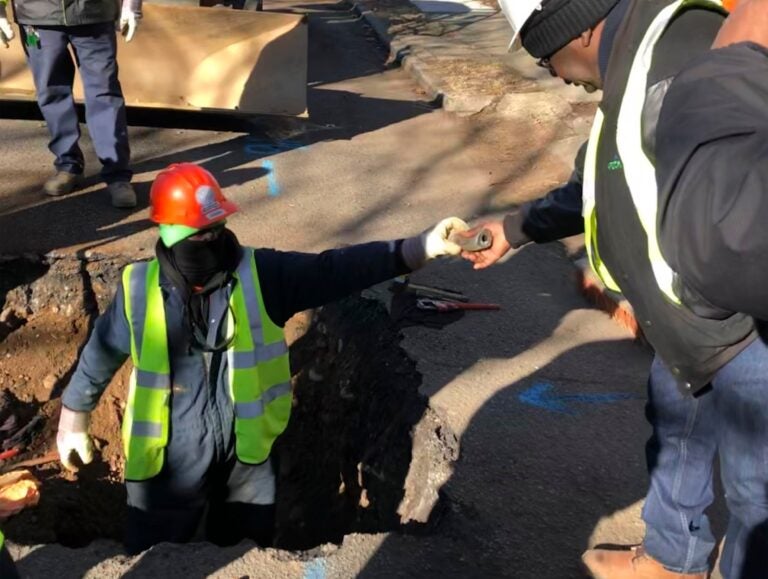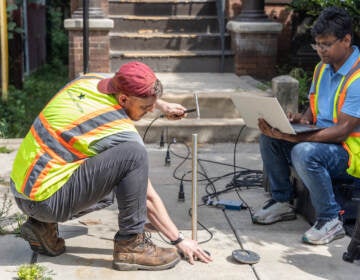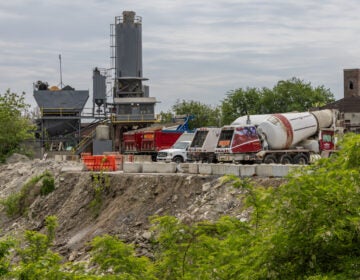Pa., N.J. and Del. to receive millions in federal dollars to replace lead pipes
Municipalities and utilities are required to create an inventory of lead pipes by October.
Listen 1:15
File - A worker hands a piece of lead pipe to a colleague as they work to remove water service lines Thursday, Jan. 9, 2020 in Trenton, N.J. (AP Photo/Mike Catalini)
From Philly and the Pa. suburbs to South Jersey and Delaware, what would you like WHYY News to cover? Let us know!
Pennsylvania will receive more than $152 million to find and replace thousands of lead service lines throughout the state, the Environmental Protection Agency announced Thursday.
It’s part of $3 billion in new funding allocated through President Joe Biden’s Investing in America agenda.
The EPA estimates there are about 9 million of these lines across the country, particularly in older cities. Finding and replacing them is an immense and costly undertaking, and many cities don’t even know where they are — or how many exist.
“It’s tough for municipalities and utilities to do alone, especially smaller ones. So [the new funding is] a godsend,” said EPA Mid-Atlantic Regional Administrator Adam Ortiz during an interview with WHYY News. “[We have] some of the oldest towns and cities in the country. So the inventory is vast. And, the poorer communities are the ones that struggle the most to catch up.”
Delaware and New Jersey will also receive over $28.6 million and more than $123 million, respectively.
The EPA is requiring water providers to create a public inventory of lead water pipes by October. The mandate comes years after lead contamination in Flint, Michigan, resulted in elevated lead levels in children’s blood.
Lead can seep into drinking water through service lines that connect to buildings and homes. The potent neurotoxin can cause serious health problems, including damage to brain development among children.
The Biden administration announced $15 billion in funding from the Bipartisan Infrastructure Law in 2021, aiming to replace all lead pipes in the U.S. within the next decade. The most recent round of federal funding is part of a total of $9 billion from EPA’s Lead Service Line Replacement Drinking Water State Revolving Fund, which aims to replace up to 1.7 million lead pipes nationwide.
Last year, the EPA announced Pennsylvania ranked fourth out of all U.S. states for the most lead pipes. There are close to 689,000 lead service lines in the state, making up about 7.5% of its total inventory, according to the EPA.
“We know where the trouble spots are. Pennsylvania and New Jersey have lots of older cities, industrial cities where there’s a huge inventory of lead pipes,” Ortiz said. “We’re more sophisticated now in finding where they are. But more importantly, we have the resources now to get them out of the ground.”
A spokesperson for the Philadelphia Water Department said it estimates there are between 20,000 and 25,000 lead service lines in the city. The department has replaced 2,000 lead lines since 2017.
In 2016, Vox reported that 18 cities in Pennsylvania had higher lead exposure rates than Flint, Mich. Philadelphia and Chester were among several cities with particularly high blood level rates. The main source of lead poisoning among kids in Pennsylvania is not drinking water, rather it is deteriorating lead-based paint, according to the health department.
In 2021, 4,907 children in Pennsylvania tested positive for elevated lead levels in their blood, according to a health department spokesperson. Last year, an additional 1,812 adults were confirmed to have elevated blood lead levels.
Pennsylvania will allocate the funding through PennVEST, a state program that offers low-interest loans and grants for water quality projects. Almost half of the funding will be provided as grants and forgivable loans.
Ortiz said the state is working to identify which communities need the funding the most, but communities that are underinvested or most impacted by contamination will be prioritized.
The EPA said it takes about three years to dig up pipes, replace them, and repave streets.
“It’s important that we do as much as we can to catch up on these liabilities that have been left in the ground, out of sight, out of mind for too long, to remove that hazard from our young people,” Ortiz said.

Get daily updates from WHYY News!
WHYY is your source for fact-based, in-depth journalism and information. As a nonprofit organization, we rely on financial support from readers like you. Please give today.







